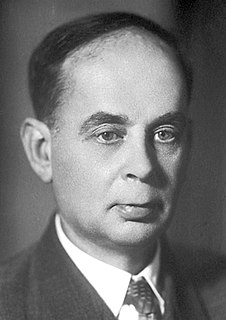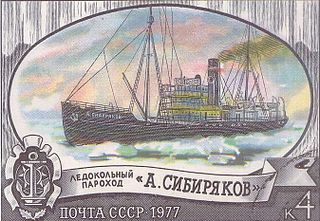This page is based on this
Wikipedia article Text is available under the
CC BY-SA 4.0 license; additional terms may apply.
Images, videos and audio are available under their respective licenses.

Ilya Mikhailovich Frank was a Soviet winner of the Nobel Prize for Physics in 1958 jointly with Pavel Alekseyevich Cherenkov and Igor Y. Tamm, also of the Soviet Union. He received the award for his work in explaining the phenomenon of Cherenkov radiation. He received the Stalin prize in 1946 and 1953 and the USSR state prize in 1971.

October Revolution Island is the largest island of the Severnaya Zemlya group in the Russian Arctic.
The Lebedev Physical Institute of the Russian Academy of Sciences, situated in Moscow, is one of the leading Russian research institutes specializing in physics. It is also one of the oldest research institutions in Russia: its history dates back to a collection of physics equipment established by Peter the Great in the Kunstkamera of Saint Petersburg in 1714. The institute was established in its present shape in 1934 by academician Sergey Vavilov. It moved to Moscow and was named after a prominent Russian physicist Pyotr Lebedev the same year. It is also known as P. N. Lebedev Institute of Physics or just Lebedev Institute. In Russian it is often referred to by the acronym FIAN (ФИАН) standing for "Physical Institute of the Academy of Sciences".

Vladimir Aleksandrovich Fock was a Soviet physicist, who did foundational work on quantum mechanics and quantum electrodynamics.

Nikolai Konstantinovich Koltsov was a Russian biologist and a pioneer of modern genetics. Among his students were Nikolay Timofeeff-Ressovsky, Vladimir Pavlovich Efroimson and Nikolay Dubinin.

Moscow Power Engineering Institute is one of the largest institutions of its kind, and is one of the leading technical universities in the world in the area of power engineering, electronics and IT. It is located in Moscow, Russia, and was founded in 1930. In Russian Federation the education in universities is available in Russian medium only. Therefore, before the main education courses would start, the foreign applicants to university courses should pass the Preliminary course for training in Russian language, followed by the State Test in Russian language. Fifteen years ago MPEI launched the program of education for foreign students in English medium, however in only one specialty – Computer Engineering. MPEI invested considerate time and resources into this program, they selected a group of leading professors who spoke English fluently, who in turn prepared the educational materials in English. Now MPEI accepts annually one full group of foreign students who speak English fluently for this IT educational program in English Language. All classes here are provided in English, hence the students in this program do not require the preliminary training in Russian language, i.e. the educational period becomes one year shorter. The annual tuition fee for this program however is more expensive, since this program is conducted in English, unlike the rest of the programs.
Kovalevsky is a Russian surname. Notable people with the surname include:
Vladimir Fyodorovich Vavilov was a Russian guitarist, lutenist and composer. He was a student of P. Isakov (guitar) and Iogann Admoni (composition) at the Rimski-Korsakov Music College in Leningrad. He played an important part in the early music revival in the Soviet Union.
"Ave Maria" is a much-recorded aria, composed by Vladimir Vavilov around 1970. Vavilov himself published and recorded it in 1970 on the Melodiya label with the ascription "Anonymous". It is believed that organist Mark Shakhin, one of the performers on the "Melodiya" LP, first ascribed the work to Giulio Caccini after Vavilov's death, and gave the "newly-discovered scores" to other musicians. The organist Oleg Yanchenko then made an arrangement of the aria for a recording by Irina Arkhipova in 1987, after which the piece came to be famous worldwide. It bears a resemblance to Jerome Kern's 1939 "All the Things You Are".

Vladimir A. Babeshko is a Russian physicist and the former President of Kuban State University in Krasnodar, Russia.

A. Sibiryakov was a Soviet icebreaker which was active in the Russian Arctic during the 1930s. She was built in 1909 in Glasgow and was originally the Newfoundland sealing steamer Bellaventure. After being purchased by Russia in 1916, she was renamed A. Sibiryakov. Her Russian name was chosen in honour of Aleksandr Mikhaylovich Sibiryakov, an Imperial Russian gold mine proprietor. Sibiryakov financed explorations to Siberia, such as Adolf Erik Nordenskiöld's, and also took part in some expeditions of his own.
Vladimir Sergeyevich Vavilov is a Russian professional football player. Currently, he plays for FC Istra.
Vladimir Vavilov may refer to:

Vladimir Polukhin was a Russian scientist and an engineer in the field of optics.
The Vavilov State Optical Institute in St Petersburg, Russia is the largest research institute in optics in Russia. It works both in pure and applied optics, and has a high reputation in the field of holography. It was established in 1918, and it is part of the Shvabe holding.

Nikolai Vavilov is a 1990 6-part biographical television film. Joint production of the USSR and Germany. Biopic devoted to the history of the life of Soviet biologist, academician Nikolai Vavilov.












